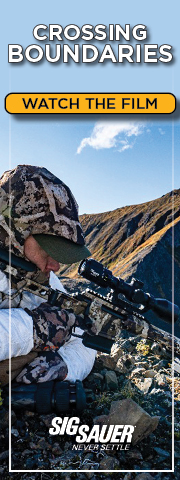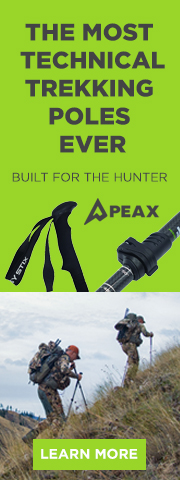Navigation
Install the app
How to install the app on iOS
Follow along with the video below to see how to install our site as a web app on your home screen.
Note: This feature may not be available in some browsers.
More options
You are using an out of date browser. It may not display this or other websites correctly.
You should upgrade or use an alternative browser.
You should upgrade or use an alternative browser.
How many years before knowing your area?
- Thread starter americanbwana
- Start date
I can relate this topic to my farm I have hunted it since 1991 and you would think I know it. Well I know almost every tree and ravine like the back of my hand. I have some areas that I kill every year in and some that I have in the past but wont go to now. Things constatntly change in the woods. I scout and learn something every year. I would say that out in the mountains covering several square miles a hunter who has hunted it for a few years can learn some and have a slight advantage over someone new to the area. I belive a few days scouting just before season is needed to get current with what is happening each year. This is why a Plan B and C are so important.
americanbwana
New member
- Sep 3, 2017
- 396
\"cnelk\" said:\"Over the years you will abandon areas you thought were great, but were only mediocre, and adopt new ones that are better. \"
Read this ^^^^^^ Read this ^^^^^^^^^ Read this ^^^^^^^^^^
Brad, this is what I\'m trying to figure out. When to abandon an area, and move on to \'greener\' pastures.
\"AmericanBwana\" said:\"cnelk\" said:\"Over the years you will abandon areas you thought were great, but were only mediocre, and adopt new ones that are better. \"
Read this ^^^^^^ Read this ^^^^^^^^^ Read this ^^^^^^^^^^
Brad, this is what I\'m trying to figure out. When to abandon an area, and move on to \'greener\' pastures.
Immediately on a hunt if things have changed. However, check it again the next year.
I had the opportunity to hunt the entire month of archery a few years ago.
This was a great asset to to determine what weeks were the better than others.
I based future hunts on that month by ENCOUNTERS I had.
I would think that having encounters should be a a big contributing factor in what area/time you hunt.
If you are not having any encounters, I would be outta there!
This was a great asset to to determine what weeks were the better than others.
I based future hunts on that month by ENCOUNTERS I had.
I would think that having encounters should be a a big contributing factor in what area/time you hunt.
If you are not having any encounters, I would be outta there!
To me the answer to Dana\'s question is sometimes and maybe. Let me explain. It depends on what I want and what I am seeing. I have set up for a single bull. That one bull was the only elk in a very large area. Once I killed him it was over. I have hunted areas where the bedding grounds and water holes/wallows stink from elk use. No maybe there, I will gladly hunt that area. When the elk move on and there are few if any fresh tracks around the water and bedding areas, I move on. I go with what I am seeing on the ground. If things are quiet for a couple three days, I start looking around the area and take in what I see. I have some good back up areas. I check them out.
I don\'t hang a stand at the first water hole I see on a map. Is the water hole getting frequent use? Don\'t waste your time if the elk are gone, unless you know with reasonable certainty they will soon return. That knowledge only comes with experience. Much knowledge comes from repeatedly hunting an area. Hopefully as you gain knowledge and experience, you get some elk along the way. Nothing helps bring things into focus like getting an elk here and there, so you can start to see a pattern.
I don\'t hang a stand at the first water hole I see on a map. Is the water hole getting frequent use? Don\'t waste your time if the elk are gone, unless you know with reasonable certainty they will soon return. That knowledge only comes with experience. Much knowledge comes from repeatedly hunting an area. Hopefully as you gain knowledge and experience, you get some elk along the way. Nothing helps bring things into focus like getting an elk here and there, so you can start to see a pattern.
cohunter14
Administrator
- Jul 10, 2017
- 5,420
\"AmericanBwana\" said:Maybe not the best title, but how many years do you spend in a new area before really having a good idea of where to look and where not to look?
I know some of you have in the same area for decades. Why did you choose that area, and why do you go back?
And yet another scenario. Our newest member, let\'s call him ElkKnob, researches an area :rtfm: and see\'s it has better than average archery success. He then spends the summer map scouting, and is even able to get one or two scouting trips in before the season starts. During his trips, he see\'s lots of elk, mostly cows. Yet come hunting season he is disappointed because of either pressure, no elk sign, or what ever. After the season he has to decide if he wants to go back to the same area, or look for another area. So here is the question. Is spending a single season in a new area enough? If not, how many years should be considered a \'good investment\' before moving on? :dk:
AB
Guys, I think the thread has gone a little sideways from Dana\'s original question, so I am quoting it again here. We all understand that the more time you spend in an area, the more you will learn. As Swede said earlier, areas you thought were great at one time turn out to me mediocre when you find better ones. But Dana\'s question revolves more around how long do you stick with an area before moving on completely? This is where I keep referring to three years. If I put in the research and believe that I am in a decent area to hunt elk, I would give myself a minimum of three years to hunt it before moving on. You should know enough in those three years to know if you want to keep hunting there or if you want to move on. But if you only hunt it one year, you will never really know enough to make a knowledgable decision, unless this is the first time you have been in the area and you find absolutely no elk sign at all while hunting.
do not think I would spend three days in an area with no fresh elk sign, let alone three years. Many areas slowly deteriorate or improve. Move on when you find a better area to hunt. Start looking around when you are not frequently seeing elk or there is no fresh elk sign. There is no magic number for determining when it is time to move. I would want somewhere to move to, and not just a place to move from.
americanbwana
New member
- Sep 3, 2017
- 396
All, very good info so far.
My go forward plan is to scout my A and B areas during the summer. The areas are about 25 miles apart, so I can easily move to the other in less than a day, and be hunting that evening. My old camp setup (Walltent and the whole shebang) didn\'t allow this mobility. My lighter, faster mode (Spike, with truck as resupply point) gives me much greater flexibility.
Both areas are road less and will require a two or three mile hike before setting up camp. I\'ve seen lot\'s of elk in the B area during prior scouting trips. Area A is brand new and I\'ve only map scouted it. There is a two by three mile gap over 2.5 miles from all three trail heads.
FWIW my 2nd - 4th year of bow hunting was spent in the same area. I learned a bunch about how the elk respond to pressure, where people camp, and where they tend to head (ranch in the valley, they left when they rounded up the cattle) to after opening day. I was quite happy to hunt there until some moron posted a \'review\' on his web site. There were 12 camps there opening day :mg: . OMG! I moved on and haven\'t been back since.
Anyway, keep posting. There are other people that have the same question(s).
AB
My go forward plan is to scout my A and B areas during the summer. The areas are about 25 miles apart, so I can easily move to the other in less than a day, and be hunting that evening. My old camp setup (Walltent and the whole shebang) didn\'t allow this mobility. My lighter, faster mode (Spike, with truck as resupply point) gives me much greater flexibility.
Both areas are road less and will require a two or three mile hike before setting up camp. I\'ve seen lot\'s of elk in the B area during prior scouting trips. Area A is brand new and I\'ve only map scouted it. There is a two by three mile gap over 2.5 miles from all three trail heads.
FWIW my 2nd - 4th year of bow hunting was spent in the same area. I learned a bunch about how the elk respond to pressure, where people camp, and where they tend to head (ranch in the valley, they left when they rounded up the cattle) to after opening day. I was quite happy to hunt there until some moron posted a \'review\' on his web site. There were 12 camps there opening day :mg: . OMG! I moved on and haven\'t been back since.
Anyway, keep posting. There are other people that have the same question(s).
AB
timberland
New member
- Aug 27, 2015
- 471
Swede-
What I meant is I hunted that spot in ten days. In those ten days I found bedding areas, wallows, etc. That I put in my gps. I backed those up with internet scouting over the summer so now I have a game plan that will last another ten days. Where i hunt the elk are isolated from a few drainages and wide open, so they are on the mountain somewhere, I just need to find them
What I meant is I hunted that spot in ten days. In those ten days I found bedding areas, wallows, etc. That I put in my gps. I backed those up with internet scouting over the summer so now I have a game plan that will last another ten days. Where i hunt the elk are isolated from a few drainages and wide open, so they are on the mountain somewhere, I just need to find them
Timberland: Thanks for the clarification. I have no issue with what you are doing. Often I will post off of someone\'s statement and use it as a teaching point. Mostly that is what I was doing with what you wrote. I call it being a mentor. I would understand if you called it being a jerk. 
timberland
New member
- Aug 27, 2015
- 471
Takes a lot more than that to offend me.  The point I was throwing into the mix is my only time i get to scout with boots on the ground is when I am actually hunting. Cataloging go to spots in my mind and gps, then backing them up with the internet sets me up for the next year, continually building the data base. The take away is that after one hunting trip I have enough spots to fill a ten day hunt.
The point I was throwing into the mix is my only time i get to scout with boots on the ground is when I am actually hunting. Cataloging go to spots in my mind and gps, then backing them up with the internet sets me up for the next year, continually building the data base. The take away is that after one hunting trip I have enough spots to fill a ten day hunt.



